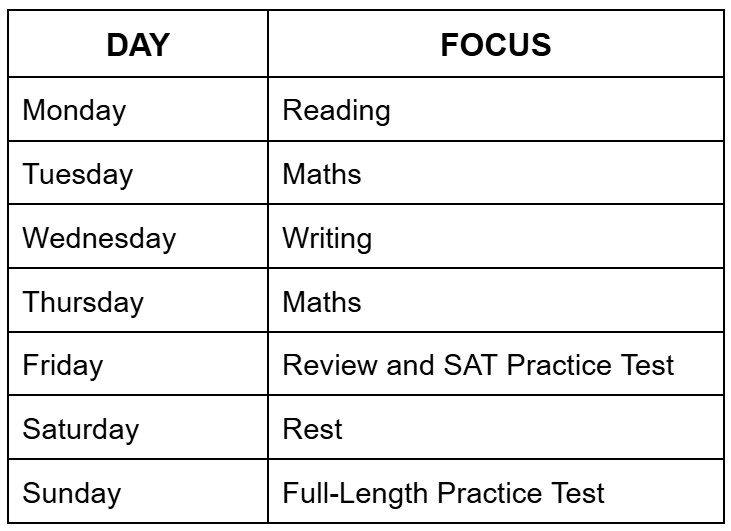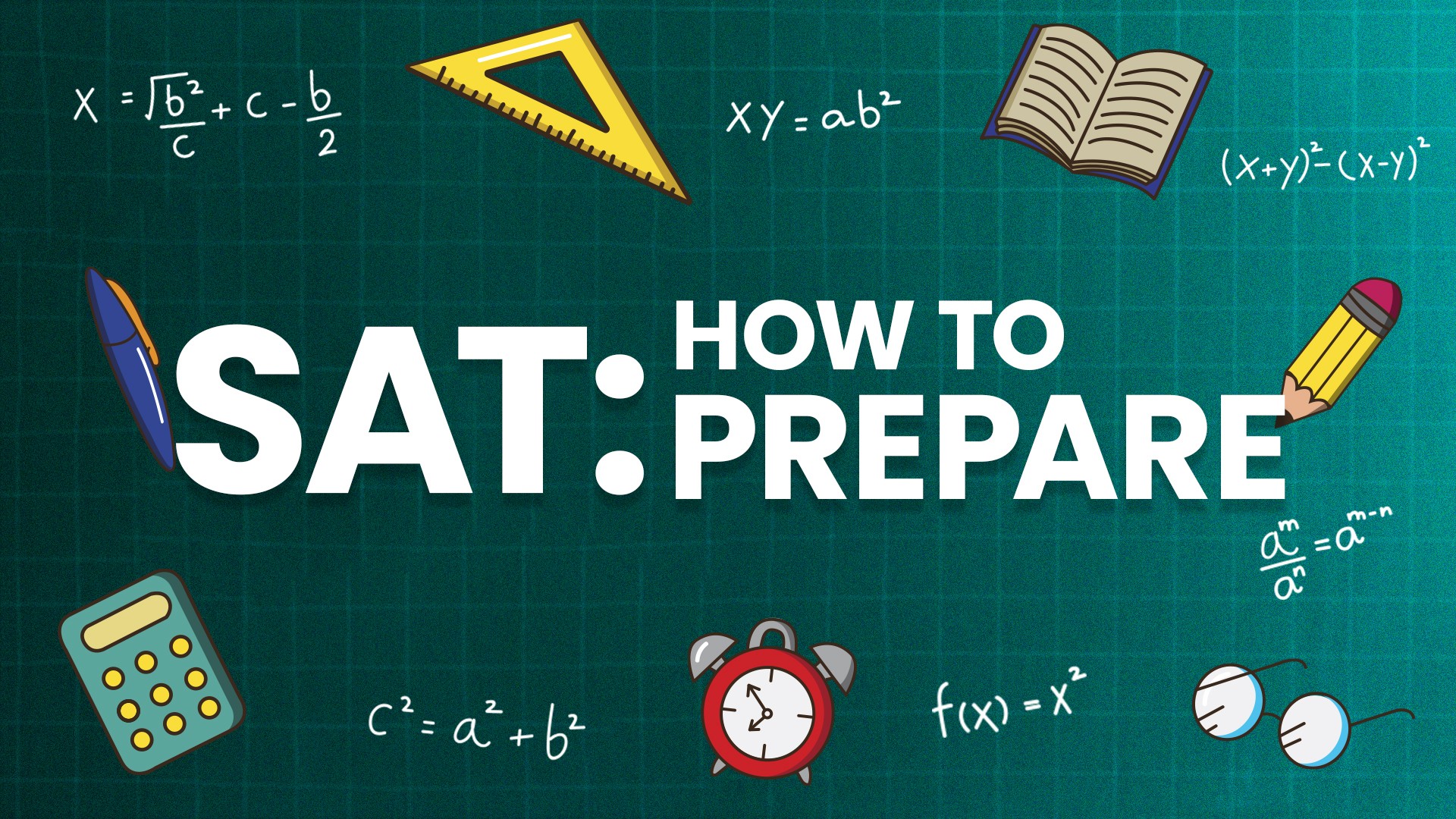The SAT is a pivotal part of the college admissions process, with millions of students taking the test each year.
Studies have shown that students who prepare for the SAT using structured study plans can see score improvements of up to 150 points on average.
Moreover, the College Board reports that more than 2 million students take the SAT annually, underscoring its importance in the journey to higher education.
With the right strategies and tools, you can prepare yourself well enough to walk into the exam room with confidence. Let's dive into some pro SAT tips to help you prepare for the SAT.

Know What You Are Preparing For
Knowing the structure of the test helps you plan your study schedule effectively. It allows you to allocate time to each section according to your strengths and weaknesses. Familiarizing yourself with the types of questions asked in each section can reduce anxiety on test day and make you more efficient in answering them.
Create A Schedule Accordingly
Consistency is key when preparing for the SAT, so create a study schedule that breaks down your preparation into manageable chunks. Aim to study for at least an hour each day, focusing on different sections of the test as this approach ensures that you cover all topics without feeling overwhelmed.
Start by assessing your current level using a diagnostic test. Based on your results, create a study plan that allocates more time to your weaker areas. Make sure to include short breaks in your study sessions to avoid burnout.
An example of a well-balanced schedule might look like this:

Practice In A Similar Way For Familiarity
One of the most effective ways to prepare for the SAT is by taking practice tests. These tests simulate the actual SAT exam environment, helping you build stamina and identify areas where you need improvement. Aim to take a full-length practice test every two weeks.
Practice tests help you get accustomed to the timing and pressure of the real test. After each test, thoroughly review your answers, especially the ones you got wrong. Understand why you made mistakes and how to avoid them in the future to steadily improve your performance.
Focus on Your Weaknesses
After taking a few practice tests, you will start to see patterns in the types of questions you struggle with. Focus your study sessions on these weak areas. Use resources like Khan Academy, which offers free, personalized practice based on your performance on the practice tests.
For instance, if you find that you consistently miss algebra questions, spend extra time reviewing algebra concepts and solving practice problems. If vocabulary is a weak spot, dedicate time each day to learning new words and understanding their usage. Strengthening your weaknesses can significantly boost your overall score.
Learn To Manage Your Time
Time management is crucial during the SAT. Practice answering questions under timed conditions to get a feel for the pace you need to maintain. Remember, it's better to move on from a tough question and come back to it later if time permits.
Developing a strategy for each section can help you manage your time effectively. For example, in the Reading section, quickly skim the passage to get the gist before diving into the questions. In the Math section, solve easier problems first to secure quick points, then return to more challenging questions. Practicing under timed conditions helps you become more efficient and confident on test day.
Give Importance To Your Language Skills

The SAT includes a lot of vocabulary questions so make it a habit to learn new words daily. Use flashcards or vocabulary apps to reinforce your learning. Understanding the context in which words are used can also help you answer these questions more accurately.
Read widely from various sources like novels, newspapers, and academic journals to understand how words are used in different contexts. Regular practice and exposure to new words will enhance your reading comprehension skills and help you tackle vocabulary questions with ease.
Make Sure Your Math Concepts Are Right
The math section covers a wide range of topics, from algebra to advanced math so ensure that your SAT math practice involves a solid understanding of basic math concepts. Practice solving problems without a calculator, as some parts of the Math section prohibit calculator use.
Review fundamental concepts such as algebraic expressions, linear equations, geometry, and trigonometry. Use online resources, textbooks, and tutoring if necessary. Solving problems manually enhances your calculation skills and prepares you for the no-calculator section. Consistent practice with a variety of problems helps reinforce these concepts and improves your problem-solving abilities.
Have A Good Grasp Of Reading
For the Reading section, practice reading complex texts from various genres. Summarize paragraphs, identify main ideas, and understand the author's tone and purpose. These skills are essential for answering reading comprehension questions effectively.
Engage with a variety of reading materials, including fiction, non-fiction, scientific articles, and historical documents. Practice active reading by highlighting key points and taking notes. Discussing what you read with others can also deepen your understanding. Developing these skills will not only help you on the SAT but also improve your overall reading comprehension abilities.
Practice On Your Essays Too
If you're taking the optional Essay, practice writing essays on different prompts. Focus on structuring your essay clearly, with a strong thesis statement, supporting evidence, and a concise conclusion. Review high-scoring sample essays to understand what graders are looking for.
Practice brainstorming ideas quickly and outlining your essay before writing. Time yourself to simulate test conditions. Pay attention to clarity, coherence, and grammar. Use examples from history, literature, and current events to support your arguments. Regular practice will help you write more effectively and efficiently under timed conditions.
Take Care Of Your Health Along The Way
In the entire process of SAT preparation, make sure that you do not neglect your health. Eat clean and on time, get in your daily exercise, and don’t sacrifice sleep to keep your brain functioning optimally. Avoid last-minute cramming and make sure you are well-rested before the test day. A healthy body and mind will help you perform your best on test day.
Utilise ChatSAT To Ensure You Are Fully Prepped

Upon signing up, ChatSAT asks you a few questions to tailor your study for SAT plan. This personalization includes sending you handwritten notes to kickstart your preparation.
You can choose between adaptive practice tests or full-length mock tests. We recommend starting with a mock test to gauge your skills across multiple domains. After completing a test, review your results by module and difficulty level. This helps you identify areas where you need more practice.
The questions in ChatSAT are meticulously crafted by subject matter experts, ensuring they align with the SAT syllabus and your understanding. Save time by raising doubts directly on the platform. ChatSAT answers your questions, helping you overcome obstacles quickly.
Conclusion
Preparing for the SAT can seem daunting, but with the right strategies and tools, you can approach the exam with confidence and poise.
Your journey to a great SAT score is a marathon, not a sprint. Stay motivated, keep a positive mindset, and make sure to take care of your health along the way. With diligent preparation and the right support, you'll be well on your way to achieving your SAT goals.
Frequently Asked Questions (FAQs)
How early should I start preparing for the SAT?
Ideally, you should start preparing for the SAT at least three to six months before your test date. This timeframe allows you to cover all topics thoroughly, take multiple practice tests, and refine your strategies without feeling rushed. Starting early also gives you the flexibility to adjust your study schedule as needed based on your progress.
How can I stay motivated during my SAT prep?
Set specific, achievable goals and reward yourself when you reach them. Study for SAT with a friend to keep each other accountable and make the process more enjoyable. Break your study sessions into manageable chunks and take regular breaks to avoid burnout. Staying motivated is easier when you have a clear plan and a support system.
What should I do the day before the SAT?
The day before the SAT, review your notes but avoid intensive studying. Make sure you have all necessary materials ready, including your admission ticket, photo ID, calculator, and snacks. Get a good night's sleep to ensure you're well-rested. Staying calm and prepared will help you perform at your best on test day.
How can I track my progress with ChatSAT?
ChatSAT provides a detailed performance review after each practice test or mock test. This review breaks down your performance by module and difficulty level, allowing you to see where you excel and where you need more practice. Additionally, you can track your progress over time, making it easier to adjust your study plan and focus on areas that require more attention.
Can I use ChatSAT alongside other SAT prep resources?
Absolutely! ChatSAT is designed to complement other online SAT prep resources. You can use it alongside traditional study guides, online courses, and tutoring sessions. ChatSAT's personalized recommendations often include resources like Khan Academy and Erica Meltzer for Reading and Writing, ensuring that you have a well-rounded preparation plan. This integrated approach helps you make the most of all available resources.
Follow ChatSAT on Instagram and LinkedIn for expert SAT tips, personalized advice, and motivational support to ace your exam with confidence!
